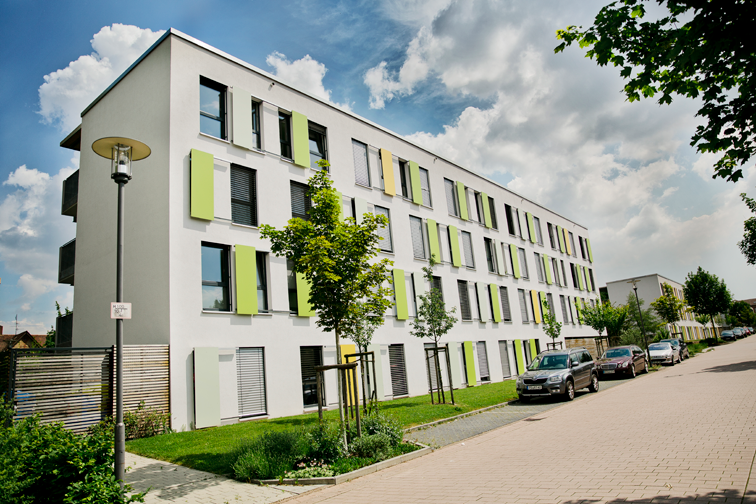Our most important topics at a glance
For years we have been building the Studierendenwerk of tomorrow, because it is clear to us that we, too, must make our contribution to modern studies. The pandemic has only accelerated many things, and we are working to keep pace as a company. Three years ago, for example, no one would have thought that a degree programme could also function digitally within a very short time. And - we are sure of it - that would have taken a few more years without the pandemic. But in the crisis it was possible to do what was difficult to imagine before, and after the pandemic it is difficult to imagine giving up what was possible during the pandemic.
So we have some catching up to do and we have used 2021 to set our course for the most important issues.
In doing so, the following topics are particularly burning under our noses. The following list of issues gives a reasonably complete picture of where we stood in 2021 and the challenges we face in the near future, and shows the topics on which we are in communication with the state of Rhineland-Palatinate.The pandemic will leave its mark, even if one day we return to a reasonably normal operation. We have accepted the challenge to change. But now we still lack support. We need discussions at eye level with all groups involved in university operations, a long-term perspective from the state of Rhineland-Palatinate and a jointly defined path for the future. We need the clear, broad lines of politics, especially on the following issues:
So we have some catching up to do and we have used 2021 to set our course for the most important issues.
In doing so, the following topics are particularly burning under our noses. The following list of issues gives a reasonably complete picture of where we stood in 2021 and the challenges we face in the near future, and shows the topics on which we are in communication with the state of Rhineland-Palatinate.The pandemic will leave its mark, even if one day we return to a reasonably normal operation. We have accepted the challenge to change. But now we still lack support. We need discussions at eye level with all groups involved in university operations, a long-term perspective from the state of Rhineland-Palatinate and a jointly defined path for the future. We need the clear, broad lines of politics, especially on the following issues:
Student housing
After years of numerous and unfortunately unsuccessful attempts, it is becoming increasingly clear: places in dormitories for students with socially acceptable rents cannot be built without free land or housing grants as in other states, and rental properties are absolutely rare. The loan offer of the ISB of the state of Rhineland-Palatinate is not suitable for the construction of new halls of residence. The state of Rhineland-Palatinate should not rely on private companies for student housing or leave the financial burden of construction to the student unions. In the DSW interview, Clemens Hoch talks about how "cheap loans [...] are worth as much as cash money." This is definitely not the case.The Studierendenwerk locations lag far behind the state average of around 10 per cent with a housing quota of just over 6 per cent (halls of residence of the Studierendenwerk and other providers). Even if students in future study 80% face-to-face and 20% digitally, this will not have any significant impact on the need for places in halls of residence.
The Studierendenwerk can no longer fulfil its statutory mandate to create socially acceptable housing without clear, sustainable financial commitments from the state. The near-termination of our dormitory project due to the loss of the KFW EH 55 subsidy right at the beginning of 2022 has shown how fragile the system for building new dormitories in Rhineland-Palatinate is.
The Studierendenwerk can no longer fulfil its statutory mandate to create socially acceptable housing without clear, sustainable financial commitments from the state. The near-termination of our dormitory project due to the loss of the KFW EH 55 subsidy right at the beginning of 2022 has shown how fragile the system for building new dormitories in Rhineland-Palatinate is.
Funding of counselling for students

We have been calling for a separate title for counselling by the student unions in the state budget for a long time (2019). We launched this in writing to the Ministry some time ago, but have not yet received a response. We are sure that good social counselling, psychological counselling and also student finance counselling is far more economical than the costs incurred by failed educational careers and dropping out of studies.The pandemic has had a very strong impact on the mental health of students. On the one hand, we are facing a wave of students for whom the fourth or fifth semester is actually the first semester of their socialisation in the new stage of life because of the pandemic. On the other hand, there is a threat of an above-average number of students dropping out in the coming semesters if we don't get a grip on this situation. Studying without social contacts, without a peer group, without support goes wrong - we experience this almost daily.
Students with child

We still have many questions about the new law on day care centres, which we have to implement from 1 July 2021. We consider the political guidelines not yet suitable for daily life or reality and fear that there will be even greater distortions. The already weak profession of childcare workers has not been strengthened, but further weakened. We are very positive about the plan for further professionalisation within the Kita and look forward to well-positioned and modern daycare centres of tomorrow, but we believe that there is still room for improvement (Our letter to the Ministry).
One issue is particularly urgent: staff shortages! We are facing huge problems in retaining skilled workers in the long term under the current conditions. The loss of care services threatens to become the rule in the Kita. Our urgent appeal to the state government: make the new law on childcare centres more suitable for everyday use and give real incentives for childcare workers.
One issue is particularly urgent: staff shortages! We are facing huge problems in retaining skilled workers in the long term under the current conditions. The loss of care services threatens to become the rule in the Kita. Our urgent appeal to the state government: make the new law on childcare centres more suitable for everyday use and give real incentives for childcare workers.
Digitalization

We have made very good progress with our own corporate digitalisation, but now our halls of residence, daycare centres and parts of the canteen and cafeteria are still pending. High-availability and fast internet and the mapping of all processes in digital form are becoming increasingly important and have become a decisive factor, especially when students decide on a hall of residence. Today, the real estate maxim no longer applies: "location, location, location", but "broadband, broadband, broadband". This conversion costs money and is reflected in the rent. Here, too, we need financial support.
Sustainability

We think that the universities - including us as partners - and their network have to contribute a much bigger part to sustainability than before. They need to play a much bigger exemplary role in sustainability as showcase project. But for this they need support.
For example, we have explored the possibilities for a sustainable refectory as far as possible:
If canteens are to remain places of affordable food for students and at the same time act sustainably, then this is not possible without political support and the promise of "sustainability subsidies". We are ready to become a "sustainability showcase project" and believe that universities are the right place for this.
For example, we have explored the possibilities for a sustainable refectory as far as possible:
- Receiving the Rhineland-Palatinate Environmental Award 2019,
- Recup reusable cups instead of disposable cups in all cafeterias. The Studierendenwerk is disposable cup-free.
- Use of artificial intelligence from delicious data in menu planning;
- Commitment to purchase free-range eggs, which many partners in the purchasing cooperation in southern Germany have now adopted.
- Only regional purchasing of pork and beef from a maximum radius of 300 km;
- Seasonal purchasing of products from the "Palatinate garden",
- Using only fair-trade coffee.
If canteens are to remain places of affordable food for students and at the same time act sustainably, then this is not possible without political support and the promise of "sustainability subsidies". We are ready to become a "sustainability showcase project" and believe that universities are the right place for this.
Communication with the State of Rhineland-Palatinate

We demand - where it makes sense - that the student unions be included in talks about the higher education landscape. The Studierendenwerk is the social backbone of the students and yet is not taken into account in many talks. In recent years, we have hardly ever been included in discussions that have had a major impact on our work. The entire university network must sit down at one table! In any case, we are always ready to do so within the scope of our tasks.
BAföG

The special role of Rhineland-Palatinate in processing BAföG does not make economic sense from our point of view, nor does it enable holistic financial counselling for students, which is very important to us. Especially when it came to awarding the student bridging aid, we found that it was almost impossible for us to get a comprehensive picture of the students' financial situation because we had no insight into the status of the respective BAföG applications. Should the state of Rhineland-Palatinate think about adjusting the BAföG awarding process to match that of the other federal states, we would like to send a positive signal already now that we would be willing to take on this task.
